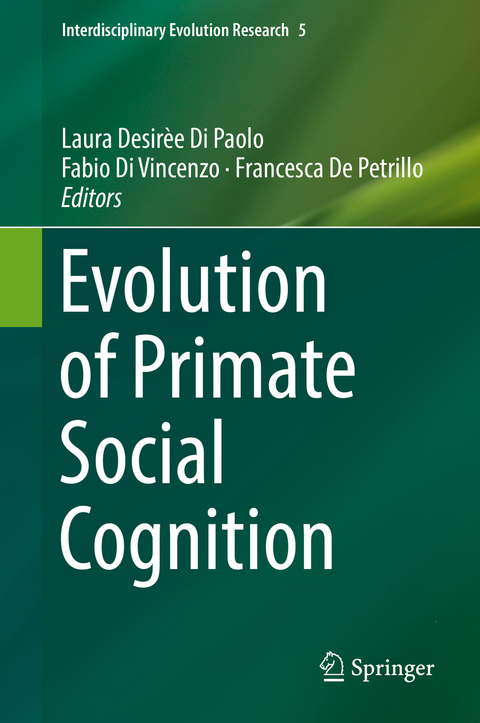
Evolution of Primate Social Cognition
Springer International Publishing (Verlag)
978-3-319-93775-5 (ISBN)
The first part focusses on various aspects of social cognition across primates, from the relationship between food and social behaviour to the connection with empathy and communication, offering a multitude of innovative approaches that range from field-studies to philosophy.
The second part details the various epistemic and methodological means there exist to study social cognition, in particular how to ascertain the proximal and ultimate mechanisms of social cognition through experimental, modelling and field studies.
In the final part, the mechanisms of cultural transmission in primate and human societies are investigated, and special attention is given to how the evolution of cognitive capacities underlie primates' abilities to use and manufacture tools, and how this in turn influences their social ecology.
A must-read for both, young scholars as well as established researchers!
Laura Desirèe Di Paolo, is a postdoctoral fellow at the Lichtenberg-Kolleg in the Institute for Advanced Study at the Georg-August University of Göttingen and member of the Primate Cognition Research Group at the Leibniz Science Campus in Göttingen. She is a philosopher of cognitive and life sciences, with a particular interest in primatology, and in comparative and developmental psychology. Her work focuses on social cognition and social learning strategies in human and nonhuman primates, and on their impact on the evolution of human-like cultural cognition. Fabio Di Vincenzo is a postdoctoral fellow at the Department of Environmental Biology of the Sapienza University in Rome. He is councillor of the Italian Institute of Human Paleontology (IsIPU) and the Italian Institute of Anthropology (IsITA). His scientific interests focus on the evolution human populations during the Middle Pleistocene in Europe. Francesca De Petrillo is a postdoctoral researcher at the Department of Psychology at the University of Michigan. Her research examines the evolutionary origins of human cognition by employing a multidisciplinary approach integrating both comparative and developmental research. In doing so, she aims to elucidate which aspects of cognition are unique to humans, and how species’ differences in life history, ecology, and social structure account for differences in their cognitive skills. She received a PhD in Environmental and Evolutionary Biology from Sapienza University of Rome and conducted postdoctoral research at Harvard University and the University of Michigan.
Part 1: Aspects of Primate Social Cognition.- 1. What did you get? What social learning, collaboration, prosocial behaviour, and inequity aversion tell us about primate social cognition.- 2. Affective stages, motivation, and prosocial behaviour in primates.- 3. Understanding empathy from the coordinative movement in humans and non-human primates.- 4. The cognitive implications of intentional communication: A multi-faceted mirror.- 5. A comparison of socio-communicative behaviour in chimpanzees and bonobos.- Part 2: Studying Primate Social Cognition: Theory, Observation, Experiments, and Modelling.- 6. Primate social cognition - evidence from primate field studies.- 7. Contribution of social network analysis and collective phenomena to understanding social complexity and cognition.- 8. Comparative economics: Using experimental economics paradigms to understand primate social decision-making.- 9. The special case of non-human primates in animal experimentation.-10. Epigenetics and the evolution of human cognition.- 11. Neanderthals and Homo sapiens: Cognitively different kinds of human?.- Part 3: Cultural Artifacts and Transmission in Primates.- 12. Recognition culture in primate tool use.- 13. Culture and selective social learning in wild and captive primates.- 14. The zone of latent solutions concept and its relationship to the classics.- 15. Minimal cognitive preconditions on the ratchet.- 18. Emulation, (over)imitation and social creation of cultural information.- 19. The Acquisition of Biface Knapping Skill in the Acheulean.- 20. Visuospatial integration: Palaeoanthropological and archaeological perspectives
| Erscheinungsdatum | 27.09.2018 |
|---|---|
| Reihe/Serie | Interdisciplinary Evolution Research |
| Zusatzinfo | XIV, 326 p. 21 illus., 14 illus. in color. |
| Verlagsort | Cham |
| Sprache | englisch |
| Maße | 155 x 235 mm |
| Gewicht | 815 g |
| Themenwelt | Naturwissenschaften ► Biologie ► Evolution |
| Schlagworte | brain evolution • Cognitive Sciences • comparative psychology • Cultural Cognition • Cultural Transmission • Ethology • evolution of culture • food-sharing • Mind-reading • primate archaeology • primate social behaviour • primatology • social learning |
| ISBN-10 | 3-319-93775-8 / 3319937758 |
| ISBN-13 | 978-3-319-93775-5 / 9783319937755 |
| Zustand | Neuware |
| Haben Sie eine Frage zum Produkt? |
aus dem Bereich


